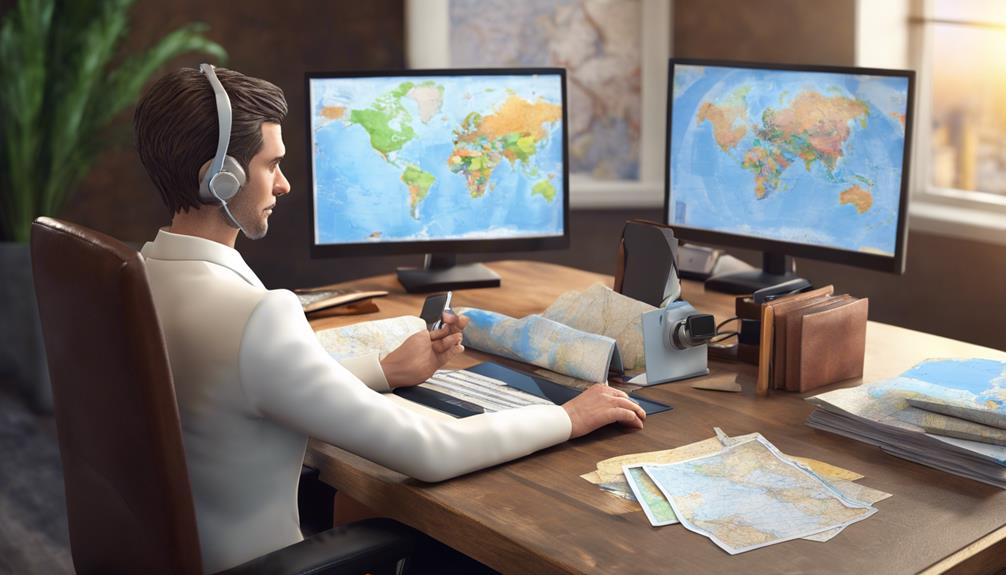Travel Agent Job Description
As a travel agent, you'll handle diverse tasks like assisting clients efficiently, prioritizing activities, and delivering exceptional service. Your customer service skills are essential for tailoring travel plans, resolving conflicts, and building strong relationships. Expert destination knowledge allows you to enhance customer experiences with tailored trips and insightful recommendations. By booking accommodations, arranging transportation, and handling payments securely, you guarantee seamless travel planning. Your problem-solving abilities and effective communication are pivotal for resolving issues diplomatically and building strong client relationships. Adhering to industry regulations and certifications ensures credibility and expertise. Your role as a travel agent involves a blend of skills for creating smooth travel experiences.
Key Takeaways
- Assist clients in planning and booking travel arrangements efficiently.
- Provide expert destination advice with personalized recommendations.
- Handle inquiries, research destinations, and make reservations promptly.
- Stay informed about travel restrictions, visa requirements, and destination knowledge.
- Build strong client relationships for exceptional service delivery.
Responsibilities
When working as a travel agent, your primary responsibility is to assist clients in planning and booking their travel arrangements efficiently and effectively. Time management is vital in this role as you juggle multiple tasks simultaneously. Your multitasking skills are put to the test daily as you handle inquiries, research destinations, make reservations, and guarantee all travel details align with the client's preferences. Prioritizing activities based on deadlines and importance is key to meeting client expectations and delivering exceptional service.
In the fast-paced environment of travel planning, time management skills enable you to allocate sufficient time to each client while meeting overall booking targets. Multitasking abilities allow you to handle various client requests promptly without compromising on quality. By efficiently managing your time and multitasking effectively, you can enhance productivity, increase customer satisfaction, and ultimately drive the success of your travel agency.
Customer Service Skills
Effective customer service skills are essential for travel agents to build strong client relationships and guarantee smooth travel experiences. Here are four key aspects of customer service skills that are important for travel agents:
- Active Listening: By attentively listening to your clients' needs and concerns, you can tailor their travel plans to meet their specific requirements, enhancing their overall satisfaction.
- Empathy: Showing empathy towards clients' situations, whether it be a request for last-minute changes or dealing with unexpected travel disruptions, can greatly improve client satisfaction levels.
- Conflict Resolution: Being adept at resolving conflicts efficiently and amicably is crucial in ensuring that any disagreements or issues are handled promptly, allowing for a positive outcome for all parties involved.
- Effective Communication: Clear and concise communication with clients regarding travel details, policies, and any changes is key to providing exceptional customer service and maintaining high levels of client satisfaction.
Destination Knowledge
You must possess expert destination knowledge to provide valuable advice to travelers, offer insights into local attractions, and guarantee a smooth trip.
Understanding travel restrictions and requirements is vital in assisting clients with their travel plans.
Your awareness of these key points will enhance your ability to create memorable and tailored experiences for your customers.
Expert Destination Advice
With a deep understanding of various destinations worldwide, travel agents provide invaluable expertise in offering expert destination advice to travelers seeking memorable and well-planned trips. When seeking guidance from a travel agent, you can expect to benefit from:
- Travel Recommendations: Travel agents can offer personalized recommendations based on your preferences, ensuring you make the most of your trip.
- Insider Tips: Benefit from insider knowledge on hidden gems, best times to visit, and unique experiences that guidebooks may not cover.
- Destination Trends: Stay updated on the latest travel trends and emerging destinations to enhance your travel experiences.
- Cultural Insights: Gain a deeper understanding of local customs, traditions, and etiquette to enrich your travel experience.
Travel agents serve as invaluable resources for travelers looking to make the most of their journeys.
Local Attractions Insights
Local attractions insights are essential components of a travel agent's destination knowledge, providing travelers with valuable information on must-see sites and unique experiences. When advising clients on local attractions, offering insider tips can elevate their travel experience. From local cuisine recommendations to hidden gems off the beaten path, a well-rounded understanding of the destination can set you apart as a knowledgeable travel agent. By delving into lesser-known attractions, you can create memorable itineraries that cater to individual preferences and interests. Sharing these insights not only showcases your expertise but also helps clients discover hidden treasures they might have otherwise overlooked.
| Local Cuisine Recommendations | Insider Tips | Hidden Gems |
|---|---|---|
| Try the seafood at the waterfront restaurant | Visit the local markets for authentic flavors | Explore the secluded beach coves |
Travel Restrictions Awareness
Awareness of travel restrictions is crucial for travel agents to navigate the ever-changing landscape of destination knowledge effectively. To stay ahead in this dynamic environment, you must keep a close eye on various factors:
- Travel advisories: Regularly check official sources for updates on travel advisories to provide accurate information to clients.
- Quarantine requirements: Stay informed about quarantine rules imposed by different countries to advise travelers properly.
- Border closures: Monitor border closures to avoid booking complications for clients.
- Visa updates: Keep track of visa requirements and updates to guarantee seamless travel planning for your customers.
Booking Accommodations
When booking accommodations as a travel agent, your role involves:
- Selecting suitable options based on clients' preferences,
- Negotiating to secure the best rates, and
- Verifying all reservation details to guarantee a seamless experience for travelers.
By carefully considering factors like location, amenities, and budget, you can provide tailored recommendations that meet your clients' needs.
Efficiently managing the booking process will enhance customer satisfaction and strengthen your reputation as a reliable travel agent.
Selecting Suitable Accommodations
To effectively assist clients in their travel planning, travel agents prioritize selecting suitable accommodations that align with their preferences and budgetary constraints. When choosing accommodations, consider the following:
- Room Preferences: Understand if clients prefer single or double rooms, specific bedding arrangements, or any mobility access requirements.
- Budget Constraints: Take into account the client's budget limitations and offer accommodations that fit within their financial boundaries.
- Amenities: Evaluate if clients prioritize amenities like a gym, pool, spa, or complimentary breakfast during their stay.
- Location Preferences: Determine if clients prefer accommodations in the city center, near specific attractions, or in more secluded areas for relaxation.
Negotiating Best Rates
Negotiate strategically to secure the best available rates when booking accommodations for your clients. Rate negotiation strategies are vital in ensuring competitive pricing and customer satisfaction.
To excel in this aspect of your role as a travel agent, focus on building strong client relationships to leverage better deals. Research prevailing rates, understand peak seasons, and be aware of any special promotions or discounts offered by accommodations.
By presenting yourself as a repeat customer or bringing multiple bookings to a property, you can often negotiate lower rates. Always communicate openly with clients about the rates negotiated, ensuring transparency and trust.
Confirming Reservation Details
To guarantee a seamless experience for your clients, meticulously confirm reservation details when booking accommodations. Ensuring reservation accuracy and effective client communication are crucial for customer satisfaction. Follow these key steps to optimize the reservation confirmation process:
- Double-check reservation dates and times to avoid any discrepancies.
- Verify room preferences and special requests with the accommodation provider.
- Confirm the total cost, including any additional fees or taxes.
- Provide clients with a detailed itinerary outlining all reservation details.
Arranging Transportation
When arranging transportation as a travel agent, consider the most important routes and modes of travel for your clients' needs. Travel logistics play a vital role in ensuring a smooth journey for your clients. Start by understanding the destination, time constraints, and budget preferences to recommend suitable transportation options. Whether it's booking flights, trains, buses, or arranging private car services, your expertise in transportation logistics can enhance your clients' travel experiences.
Evaluate transportation options based on factors like cost-effectiveness, convenience, and travel time. Utilize your knowledge of different carriers, routes, and connections to create seamless travel itineraries. Consider factors such as layover times, transfer locations, and potential delays to provide your clients with reliable transportation solutions.
Creating Itineraries
When creating itineraries, emphasize trip duration planning to guarantee clients make the most of their time.
Offer guidance on selecting activities that align with their interests and preferences for a personalized experience.
Trip Duration Planning
Developing detailed itineraries for various trip durations is an essential aspect of the travel agent role, ensuring that every moment of the journey is well-planned and optimized for the traveler's experience.
When creating itineraries, consider the following:
- Matching Activities: Tailor activities to suit the length of the trip, ensuring a well-balanced schedule.
- Transit Time: Calculate the time needed for travel between destinations to avoid overloading or idle periods.
- Rest Periods: Incorporate downtime to prevent traveler fatigue and allow for relaxation.
- Flexibility: Include buffer time in case of unexpected delays or impromptu exploration opportunities.
Activity Selection Guidance
Crafting engaging and diverse itineraries hinges on thoughtfully curating activities that resonate with the traveler's interests and preferences. When offering tour planning services, it's essential to gather detailed information about the traveler's preferences, such as their activity level, interests, and any specific requests they may have.
By understanding these key factors, you can tailor your activity recommendations to suit their individual needs. Utilizing data-driven insights from previous successful itineraries can also guide you in selecting activities that have been well-received by similar travelers.
Handling Payments
To effectively manage payments as a travel agent, you must guarantee timely processing and accurate documentation for financial transactions. When handling payments, consider the following key aspects:
- Payment Processing: Utilize secure and efficient payment processing systems to make sure transactions are completed smoothly and promptly.
- Fraud Detection: Stay vigilant for any signs of fraudulent activities during payment processing to safeguard both the client and the agency.
- Currency Exchange: Be knowledgeable about currency exchange rates and provide guidance to clients on the best options for converting their money.
- Payment Options: Offer a variety of payment options to cater to different preferences and ensure convenience for clients.
Problem-Solving Abilities
Demonstrate adept problem-solving abilities as a travel agent by efficiently resolving issues that may arise during client interactions and trip planning. Critical thinking and decision-making skills are paramount in maneuvering unforeseen circumstances such as flight cancellations, accommodation issues, or itinerary changes. Your ability to analyze situations, evaluate options, and make sound decisions quickly is essential in ensuring a seamless travel experience for your clients.
Conflict resolution is another key aspect of problem-solving as a travel agent. Whether it's managing disagreements between travel companions, negotiating with service providers, or addressing client complaints, your capacity to handle conflicts diplomatically and find mutually beneficial solutions is crucial.
Additionally, teamwork plays a significant role in problem-solving within a travel agency setting. Collaborating with colleagues, suppliers, and other stakeholders to brainstorm ideas, share insights, and collectively address challenges enhances the effectiveness of problem resolution.
Communication Skills
Efficient communication with clients, suppliers, and team members is a foundational skill for successful travel agents in managing the complexities of trip planning and resolving issues effectively. In the travel industry, honing your communication skills is vital for ensuring smooth interactions with various stakeholders. Here are some key aspects to contemplate:
- Listening Skills: Actively listening to clients' needs and preferences is paramount. Understanding their desires enables you to tailor personalized travel experiences effectively.
- Cultural Awareness: Being culturally sensitive and aware of diverse customs and practices is essential. It helps in providing recommendations that align with clients' cultural expectations.
- Interpersonal Communication: Building strong relationships with clients and suppliers through effective interpersonal communication fosters trust and loyalty.
- Language Proficiency: Proficiency in multiple languages can be a significant asset. It allows you to cater to a broader clientele and engage with international suppliers more efficiently.
Industry Regulations
Understanding and adhering to industry regulations is crucial for travel agents to guarantee compliance and provide a seamless experience for clients.
Travel agent licensing is a fundamental aspect that ensures agents meet the legal requirements to operate in the industry. Obtaining the necessary licenses demonstrates professionalism and trustworthiness to clients, giving them confidence in the services provided.
Additionally, holding travel agent certifications, such as those from reputable organizations like The Travel Institute or the American Society of Travel Advisors (ASTA), can enhance credibility and expertise in the field. These certifications often require agents to undergo training, stay updated on industry trends, and adhere to a strict code of ethics, all of which contribute to offering high-quality service to clients.
Frequently Asked Questions
What Software Tools Do Travel Agents Commonly Use for Booking Accommodations?
You commonly use booking platforms and reservation systems as a travel agent to secure accommodations. These tools streamline the process, providing access to a wide range of options and ensuring efficient booking for your clients.
How Do Travel Agents Stay Updated on Industry Regulations and Changes?
To stay updated on industry regulations and changes, you can attend industry workshops, take online courses, participate in industry conferences, and read trade publications. These resources provide valuable insights and help you stay current.
Can Travel Agents Provide Personalized Recommendations for Unique Travel Experiences?
You might wonder if travel agents can offer personalized recommendations for unique experiences. They excel at crafting custom itineraries and tailoring bespoke adventures. Their expertise in experiential travel guarantees your trip is unforgettable and tailored just for you.
How Do Travel Agents Handle Emergencies or Unforeseen Circumstances During Trips?
During trips, travel agents excel in crisis management by promptly addressing emergencies. Through effective client communication, they provide reassurance and guidance. They prioritize contingency planning and offer unwavering customer support to navigate unforeseen circumstances seamlessly.
Do Travel Agents Offer Travel Insurance Options to Clients for Added Protection?
When planning your trip, travel agents can offer you travel insurance options for added protection. This insurance provides benefits like coverage for medical emergencies and trip cancellations, but be sure to review the policy's coverage limits carefully.
Conclusion
You now have a better understanding of the travel agent job description.
Did you know that according to the Bureau of Labor Statistics, the employment of travel agents is projected to decline by 26% from 2019 to 2029?
This decline is attributed to the rise of online booking platforms.
As a travel agent, it's important to stay informed about industry trends and regulations to remain competitive in the ever-evolving travel industry.







